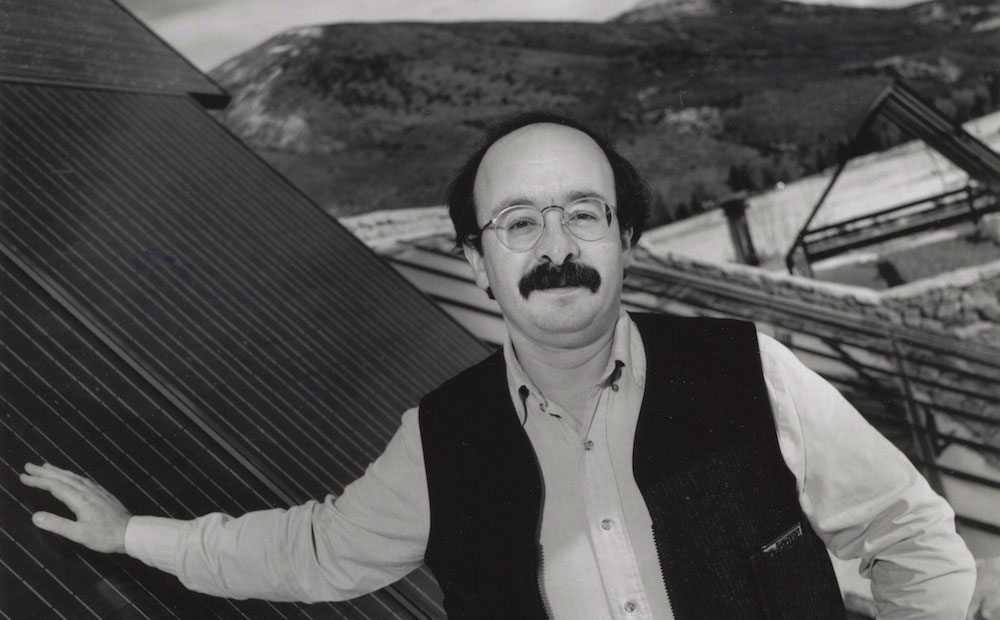

Photo: Jim Harrison
Amory Lovins
Environment
4th Heinz Awards - 1998
Amory Lovins received the 4th Heinz Award for the Environment for his extraordinary accomplishments in alerting the world to the enormous potential of energy efficiency and renewable energy resources.
Chosen several years ago by the editors of The Wall Street Journal as one of the people most likely to change the face of world industry, Mr. Lovins is an environmental visionary. He is already credited with having done more than any other single individual to redefine the thinking around energy policy and to link it with environment, development and security issues. He, his wife Hunter, and the team of researchers at the resource policy center they co-founded in Snowmass, Colorado delight in challenging conventional wisdom by demonstrating advanced resource productivity that avoids depletion and pollution, and still shows a profit.
He has done original work of high intellectual merit and has popularized his work far better than anyone else in the field, aggressively moving his ideas into widespread practice, chiefly via the private sector.
It was evident early on that Mr. Lovins had the makings of a genius. At age 21, after studying at Harvard and Oxford Universities, he became Oxford’s youngest junior faculty member in 400 years. While there, he intended to pursue an interest in the details of energy policy, two years before the oil embargo put those issues on the world’s agenda. When the university protested, he left.
Almost immediately, he set about redefining the energy debate, which, at the time, focused entirely on how more energy could be produced to meet an ever-growing demand. Mr. Lovins turned that challenge on its head by suggesting a radically different focus, not on getting more energy of any kind from any source at any price, but on providing just the amount, type, scale and source of energy that would provide each desired service in the cheapest way. That suggestion was challenged by many energy experts and greeted with derision by industry. But Mr. Lovins, frequently using his opponents’ statistics against them, calmly continued to argue his case and to meet with, debate and inform utility executives, other industry leaders and policy makers. Many of them turned from critics into clients. As a result of his work, new methods were developed to allow utilities to profit from energy efficiency, methods that have been implemented in many areas around the United States. Even more significantly, the powerful new idea – that properly structured, sustainable, least-cost energy and resource options can be beneficial both to the environment and to industry – was introduced.
In 1982, Mr. Lovins expanded his work by establishing with his wife the Rocky Mountain Institute, a research and educational foundation. Today, the pair, along with a staff of more than 40, blaze new trails investigating efficiency issues and proposing solutions that, while they may spring from Mr. Lovins’ boundless creativity, are firmly rooted in reality. One such solution currently engaging Mr. Lovins is the design of a “hypercar,” an ultra-lightweight, hybrid-electric vehicle, now moving rapidly toward the marketplace. Not only would these vehicles save fuel and prevent pollution, but Mr. Lovins argues that by accelerating the introduction of fuel cell-powered versions, hypercars used as plug-in mobile generators could quickly and profitably displace today’s coal and nuclear power plants.
Amory Lovins has briefed heads of state, written and co-authored dozens of books and hundreds of papers, and served as an advisor to scores of boards, businesses and institutions. He argues that the U.S. can operate on a fourth of the energy it now uses, while still providing the same or better services. This may seem far-fetched, but Mr. Lovins has been accused of taking off on flights of fancy before. Together, both he and time both have a remarkable way of proving his assertions correct.
Note: This profile was written at the time of the awards’ presentation.
